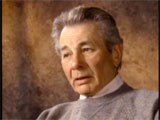You searched for: 3粉大咖引戰【TG飞机:@bapingseo】谷歌seo免费工具【TG电报:@bapingseo】南亚国外灰产【Telegram:@bapingseo】22年世界杯e乐彩线路检测路径?4wOopK/x1JJWw.html
<< Previous | Displaying results 626-650 of 665 for "3粉大咖引戰【TG飞机:@bapingseo】谷歌seo免费工具【TG电报:@bapingseo】南亚国外灰产【Telegram:@bapingseo】22年世界杯e乐彩线路检测路径?4wOopK/x1JJWw.html" | Next >>
-
Wilek (William) Loew describes the hiding place in which his mother survived an Aktion in Lvov
Oral HistoryWilek was the son of Jewish parents living in the southeastern Polish town of Lvov. His family owned and operated a winery that had been in family hands since 1870. Wilek's father died of a heart attack in 1929. Wilek entered secondary school in 1939. Soon after he began school, World War II began with the German invasion of Poland. Lvov was in the part of eastern Poland annexed by the Soviet Union. Although the Soviets took over Wilek's home and the family business, Wilek was able to continue his…
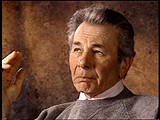
-
Wilek (William) Loew describes Budapest after he escaped from the Lvov ghetto and before the German occupation of Hungary
Oral HistoryWilek was the son of Jewish parents living in the southeastern Polish town of Lvov. His family owned and operated a winery that had been in family hands since 1870. Wilek's father died of a heart attack in 1929. Wilek entered secondary school in 1939. Soon after he began school, World War II began with the German invasion of Poland. Lvov was in the part of eastern Poland annexed by the Soviet Union. Although the Soviets took over Wilek's home and the family business, Wilek was able to continue his…
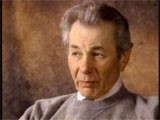
-
Wilek (William) Loew describes Jewish life in prewar Lvov, including restrictions on admission to schools
Oral HistoryWilek was the son of Jewish parents living in the southeastern Polish town of Lvov. His family owned and operated a winery that had been in family hands since 1870. Wilek's father died of a heart attack in 1929. Wilek entered secondary school in 1939. Soon after he began school, World War II began with the German invasion of Poland. Lvov was in the part of eastern Poland annexed by the Soviet Union. Although the Soviets took over Wilek's home and the family business, Wilek was able to continue his…
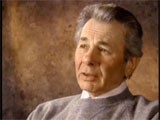
-
Wilek (William) Loew describes political prison in Budapest after the Germans arrested him as a Polish spy
Oral HistoryWilek was the son of Jewish parents living in the southeastern Polish town of Lvov. His family owned and operated a winery that had been in family hands since 1870. Wilek's father died of a heart attack in 1929. Wilek entered secondary school in 1939. Soon after he began school, World War II began with the German invasion of Poland. Lvov was in the part of eastern Poland annexed by the Soviet Union. Although the Soviets took over Wilek's home and the family business, Wilek was able to continue his…
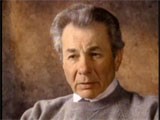
-
Erich Maria Remarque: In Depth
ArticleIn 1933, Nazi students at more than 30 German universities pillaged libraries in search of boo...
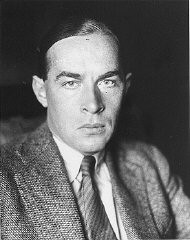
-
Manya Moszkowicz
ID CardManya was born in Chmielnik, a small Polish town that had a Jewish community dating back to the 16th century. Her father owned a furniture shop and her mother took care of the home. Manya had two younger brothers, David and Mordechai, and was surrounded by many close relatives. She attended both public and Hebrew schools and had many friends. 1933–39: In 1938 Manya's family moved to Sosnowiec, a larger city located near the German border. There she had her first experience with antisemitism. Signs…
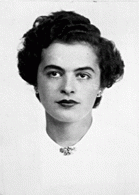
-
The United States and the Nazi Threat: 1933–37
ArticleLearn about responses in the United States to reports about Nazi anti-Jewish policies and violence against Jews from 1933–37.
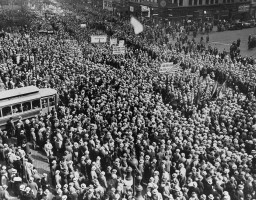
-
The Security Police (SiPo)
ArticleThe Security Police (Sicherheitspolizei, SiPo) was a German police organization created by Heinrich Himmler. Learn about its origin and role in the Holocaust.
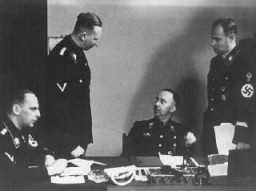
-
Julian Noga describes conditions in Flossenbürg
Oral HistoryJulian's Catholic parents had settled in the United States, but his mother returned to Poland. In 1939, Julian was deported to Austria to do farm labor after he was caught for hiding a rifle. On the farm he met the landowner's daughter, Frieda, his future wife. He was arrested in 1941 because relationships between Austrians and Poles were considered illegal and in 1942 he was deported to the Flossenbürg camp in Germany. During a forced march in 1945, he was liberated by US forces. Julian and Freida…
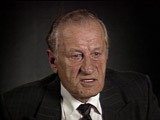
-
Art and Survival: György Beifeld's Visual Memoir from the Russian Front, 1942–1943
ArticleGyörgy Beifeld, a Jewish conscript in the Hungarian army, created a visual memoir of his experiences on the eastern front in 1942–1943 as a member of a forced-labor battalion .
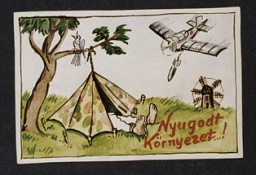
-
Lidice: The Annihilation of a Czech Town
ArticleGerman forces razed the town of Lidice in June 1942 in retaliation for the death of Nazi leader Reinhard Heydrich. Learn about the assassination and reprisal.
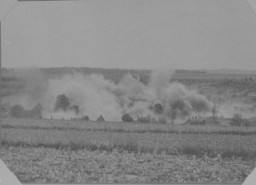
-
Gerd Jacob Zwienicki
ID CardGerd was the eldest of four children. His father, Josef, had left Ukraine in 1913 and opened a bicycle sales and repair shop in Bremen. His mother, Selma, was descended from a distinguished Jewish family and had been a kindergarten teacher and a bookkeeper for a large firm. As a child, Gerd experienced the hardships of the Depression and witnessed the violent street fights between the Nazis and their political opponents, the Communists and Socialists. 1933–39: When the Nazis came to power in 1933, Gerd…
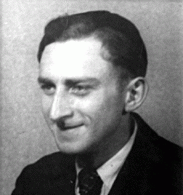
-
Vladka (Fagele) Peltel Meed describes smuggling a description of the Treblinka camp to underground leaders on the "Aryan" side of Warsaw
Oral HistoryVladka belonged to the Zukunft youth movement of the Bund (the Jewish Socialist party). She was active in the Warsaw ghetto underground as a member of the Jewish Fighting Organization (ZOB). In December 1942, she was smuggled out to the Aryan, Polish side of Warsaw to try to obtain arms and to find hiding places for children and adults. She became an active courier for the Jewish underground and for Jews in camps, forests, and other ghettos.
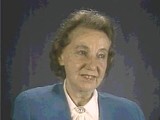
-
Norbert I. Swislocki describes leaving Warsaw with his mother upon the outbreak of war
Oral HistoryNorbert was 3 years old when Germany invaded Poland in September 1939. He and his mother were in Warsaw; his father had been drafted into the Polish army and later ended up in Vilna. Norbert and his mother set out to join him and the family was reunited after a few months. After the family had been in Vilna for about a year, Norbert's father was able to obtain visas for Curacao in the Dutch West Indies and visas for transit through Japan. Norbert and his parents left Vilna in January 1941, and arrived in…
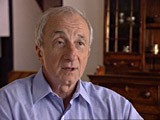
-
Norbert Wollheim describes his liberation at Schwerin, in northeast Germany, in May 1945
Oral HistoryNorbert studied law and was a social worker in Berlin. He worked on the Kindertransport (Children's Transport) program, arranging to send Jewish children from Europe to Great Britain. His parents, who also lived in Berlin, were deported in December 1942. Norbert, his wife, and their child were deported to Auschwitz in March 1943. He was separated from his wife and child, and sent to the Buna works near Auschwitz III (Monowitz) for forced labor. Norbert survived the Auschwitz camp, and was liberated by US…
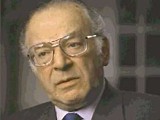
-
Norbert I. Swislocki describes fleeing from Warsaw with his mother
Oral HistoryNorbert was 3 years old when Germany invaded Poland in September 1939. He and his mother were in Warsaw; his father had been drafted into the Polish army and later ended up in Vilna. Norbert and his mother set out to join him and the family was reunited after a few months. After the family had been in Vilna for about a year, Norbert's father was able to obtain visas for Curacao in the Dutch West Indies and visas for transit through Japan. Norbert and his parents left Vilna in January 1941, and arrived in…
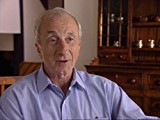
-
Edward Lessing describes wearing the compulsory Jewish badge.
Oral HistoryEdward was born to a Jewish family in The Hague. In 1929, the family moved to the United States. Because his father had difficulty finding employment, Edward and his family returned to the Netherlands in 1932. They were living in the town of Delft and running a small clothing store when war broke out. Germany invaded the Netherlands in May 1940. Anti-Jewish decrees were instituted, increasing in severity to the point that Jews could no longer own businesses and were forced to wear a yellow badge after May…
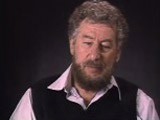
-
Flight and Rescue
ArticleExplore the story of over 2,000 Polish Jewish refugees who fled east to escape war-torn Europe. They sought safety in such distant places as China and Japan.
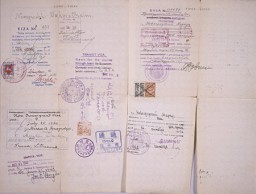
-
Italy
ArticleItaly was home to one of the oldest Jewish communities in Europe. It was also a member of the Axis alliance with Nazi Germany. Learn about Italy during WWII and the Holocaust.
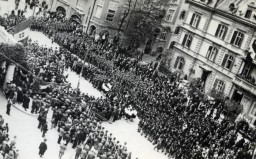
-
Elie Wiesel
ArticleElie Wiesel was a human rights activist, author, and teacher who reflected on his experience during the Holocaust in more than 40 books. Learn more.
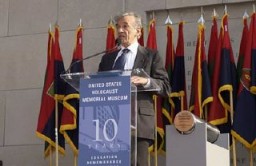
-
Wilek (William) Loew describes the roundup of Jews during August 1942 deportation from Lvov to Belzec
Oral HistoryWilek was the son of Jewish parents living in the southeastern Polish town of Lvov. His family owned and operated a winery that had been in family hands since 1870. Wilek's father died of a heart attack in 1929. Wilek entered secondary school in 1939. Soon after he began school, World War II began with the German invasion of Poland. Lvov was in the part of eastern Poland annexed by the Soviet Union. Although the Soviets took over Wilek's home and the family business, Wilek was able to continue his…
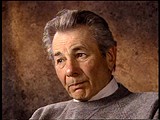
-
Wilek (William) Loew describes forced evacuation from Auschwitz
Oral HistoryWilek was the son of Jewish parents living in the southeastern Polish town of Lvov. His family owned and operated a winery that had been in family hands since 1870. Wilek's father died of a heart attack in 1929. Wilek entered secondary school in 1939. Soon after he began school, World War II began with the German invasion of Poland. Lvov was in the part of eastern Poland annexed by the Soviet Union. Although the Soviets took over Wilek's home and the family business, Wilek was able to continue his…
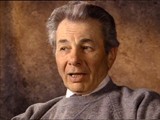
-
Wilek (William) Loew describes forced labor in Lvov
Oral HistoryWilek was the son of Jewish parents living in the southeastern Polish town of Lvov. His family owned and operated a winery that had been in family hands since 1870. Wilek's father died of a heart attack in 1929. Wilek entered secondary school in 1939. Soon after he began school, World War II began with the German invasion of Poland. Lvov was in the part of eastern Poland annexed by the Soviet Union. Although the Soviets took over Wilek's home and the family business, Wilek was able to continue his…
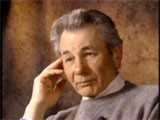
-
Wilek (William) Loew describes refugees from western Poland after their arrival in Soviet-occupied Lvov
Oral HistoryWilek was the son of Jewish parents living in the southeastern Polish town of Lvov. His family owned and operated a winery that had been in family hands since 1870. Wilek's father died of a heart attack in 1929. Wilek entered secondary school in 1939. Soon after he began school, World War II began with the German invasion of Poland. Lvov was in the part of eastern Poland annexed by the Soviet Union. Although the Soviets took over Wilek's home and the family business, Wilek was able to continue his…
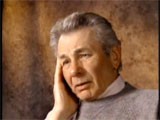
-
Wilek (William) Loew describes the Soviet occupation of Lvov in 1939
Oral HistoryWilek was the son of Jewish parents living in the southeastern Polish town of Lvov. His family owned and operated a winery that had been in family hands since 1870. Wilek's father died of a heart attack in 1929. Wilek entered secondary school in 1939. Soon after he began school, World War II began with the German invasion of Poland. Lvov was in the part of eastern Poland annexed by the Soviet Union. Although the Soviets took over Wilek's home and the family business, Wilek was able to continue his…
